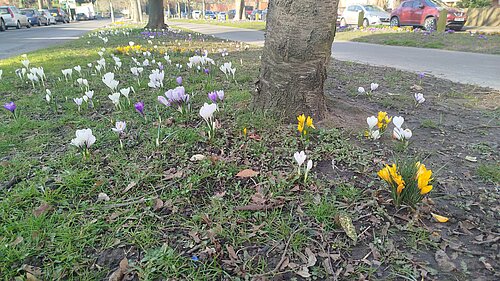Reducing Council Pesticide Use in Folkestone and Hythe

A local resident contacted me recently to ask if Folkestone and Hythe District Council use pesticides locally, and if so how they are working to reduce their use.
"I am writing to you as a local resident who is very concerned that the council may be using pesticides in public spaces such as parks, playgrounds, cemeteries, pavements, and housing estates.
“I would be hugely grateful if you could please respond to my email to let me know if the council is currently using pesticides and whether there is a reduction plan in place.”
Now I knew F&HDC having been trying to reduce the use of pesticides and herbicides over some years, especially since a Council Motion in 2019 moved by Connor McConville seeking to limit their use.
Councillor McConville outlined his motion which was set out in the agenda.
Proposed by Councillor Connor McConville, Seconded by Councillor David Monk and resolved that this Council:
- Move towards phasing out the use of all pesticides and weed killers in council owned parks, gardens and play areas.
- Trial pesticide-free alternatives to control weeds in these areas. These might include biodegradable foam or hot steam treatments on weeds.
- To report the outcomes of these trials to the Climate and Ecological Emergency working group for discussion and recommendation within 12 months.
- Grant an exception to the above ‘phasing out’ regarding the control of Japanese knotweed, or other invasive species, where there are currently no effective mechanical techniques available.
For these plants glyphosate will be stem-injected, rather than sprayed, to reduce its spread in the environment.
- Grant an exception on sprays only in relation to Giant Hogweed where it’s not safe to be dug out or safely removed by other means or where invasive plants are too small to be stem injected.
- It is recognized that herbicides are required for the control of weeds in fine turf such as bowling greens and tennis courts. Any chemical use will be kept to an absolute minimum and alternative methods of control, trialed when and if they become available.
- Write to the secretary of state for the environment to inform the government of this Council’s opposition to glyphosate-based pesticides and to call for a UK-wide programme to phase out use once trials have been concluded and viable alternatives have been introduced for weed control across the District.
(Voting: For 27; Against 0; Abstentions 0)
There are some situations where there are limited effective alternatives, but in “day to day” running we try to keep their use to a minimum and reduce as much as possible.
By 2021, the Council had decreased their use by 80% from a peak of 75 litres to 14.5 litres in 2021 - an impressive response. However, I was keen to see if progress had continued since 2021, and asked officers to update me (so I could respond to my correspondent).
I'm told that the position now is as follows. The total pesticide usage in the district since 2015:
Year | 2015 | 2016 | 2017 | 2018 | 2019 | 2020 | 2021 | 2022-2023 | 2024 |
Litres | 50 | 70 | 30 | 75 | 17 | 11 | 14.5 | 3.304 | 1.675 |
Application Type | Glyphosate (L) 2019 to 2021 Total use | Application Type | Glyphosate (L) 2024 Total use | |
Paths/Hardstanding | 17.92 | Paths/Hardstanding | 0.825 | |
Invasive Weeds | 13.15 | Invasive Weeds | 0.85 | |
Cemetery Strips | 8.93 | Cemetery Strips | 0 | |
Preparing Flower Beds | 1.66 | Preparing Flower Beds | 0 | |
Sports Areas | 1.2 | Sports Areas | 0 | |
Total | 42.86 | Total | 1.675 |
This is the usage in the different areas FHDC looks after. Highway pavements are KCCs responsibility, and we do not hold data for this.
We have actively try to reduce our usage, however there are certain occasions where herbicides are essential. The treatment of invasive species, such as Giant Hogweed and Japanese Knotweed, is performed by stem injection and the painting of leaves if too small to inject.
Eco Plugs are used when tree stumps cannot be removed by grinding. In 2024, 227 were used, but most of these were on the Road of Remembrance following the land slip and subsequent vegetation clearance works on FHDC land.
We no longer treat the cemeteries or flower beds with any herbicide. The hard court areas were treated with 0.05L of Qualgex in 2024 to stop the growth of moss.
So from a peak of 75 litres in 2018, usage dropped 73.325 litres to 1.675 litres in 2024, a drop of over 97%. I'd say that's a pretty solid reduction plan.
